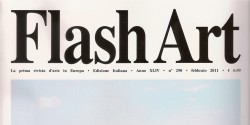Tuesday through Sunday from 12:00 until 21:00
Closed Monday
Admission is Free


The award ceremony for this year’s PinchukArtPrize, the biggest art prize for young Ukrainian artists, was a quietly modest event held for nominees and hosts only. The usual party, planned for December 6, was cancelled due to overwhelming anti-government rallies in Kyiv. On the night of November 30, special police units attacked protesters who had gathered in the main square to oppose the government’s delay in the signing the European Union Association Agreement. After a case of police brutality, many Kyiv citizens and people from all over the country began holding demonstrations and picketing governmental institutions.
By the time the winners of the Pinchuk ArtPrize were announced, their artworks had entered a whole different context. The Main Prize went to Zhanna Kadyrova, the already well-known young artist, famous for her humorous, eye-catching tile objects and asphalt ready-mades. This time she adapted the tradition of soviet mosaics, presenting in her monumental artwork the heroes of contemporary popular culture: athletic young men accompanied by glamorous girls in posh cars, interspersed with sparks of champagn and fireworks. Coincidentally, the day afterZhanna’s interpretation of soviet visual propaganda received the award, the almost seventyyear- old monument to Lenin across the street from the Pinchuk Art Centre was demolished by ultra-right-wing protesters. The First Special Prize was given to the Open Group, a Lviv collective of five artists: Yuriy Biley, Pavlo Kovach, Yevhen Samborsky, Stanislav Turina and Anton Varga. Their multimedia work Ars Longa, Vita Brevis shows the many ways of continuous connection and communication between what is within the institution (the archive) and behind its walls (the everyday creation of new “galleries” in Lviv).
The Second Special Prize had to be doubled in order to award two outstanding artists, both of whom engaged the space of the Art Centre as a part of their works. Lada Nakonechna created an accurate copy of the exhibition space on a tromp l’oeil wall, thoroughly watched by a security guard to prevent people from walking behind it as a part of the artistic manipulation. Another manipulator, Daniil Galkin, constructed a gigantic multi-level tourniquet, controlling the pace and direction of viewers’ movement through the room in order to metaphorically describe the policy of social intimidation. The People’s Choice Prize was a pleasant surprise, given to Anatoliy Byelov for his short musical film Sex, Medical, Rock ‘n’ Roll. It is a story of homosexual relationships, love triangles and human drama, featuring intentionally plain and candid songs as well as exaggeratedly theatrical imagery. Visitors, who left the Art Centre crooning Byelov’s “My lover is not a kisser,” now have real proof that conservative and prudish barriers within post-soviet society are being successfully broken.